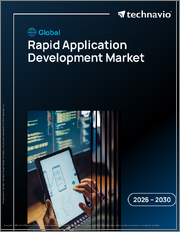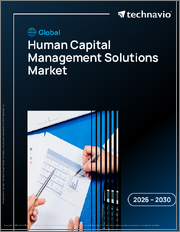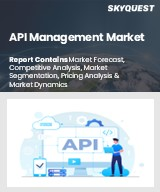
|
시장보고서
상품코드
1555604
클라우드 API 시장 : 세계의 산업 분석, 규모, 점유율, 성장, 동향, 예측(2024-2033년)Cloud API Market: Global Industry Analysis, Size, Share, Growth, Trends, and Forecast, 2024-2033 |
||||||
Persistence Market Research는 전 세계 클라우드 API 시장에 대한 종합적인 보고서를 발표했습니다. 이 보고서는 홍보 요인, 동향, 기회, 과제 등 주요 시장 역학을 상세하게 분석하고 전체 시장 구조에 대한 귀중한 인사이트을 제공합니다.
주요 인사이트
- 클라우드 API 시장 규모(2024년) : 10억 3,900만 달러
- 예측 시장 매출(2033년) : 52억 8, 130만 달러
- 시장 성장률(복합 연간 성장률(CAGR) 2024년-2033년) : 19.8%
클라우드 API 시장 : 보고 범위:
클라우드 API 시장은 디지털 인프라를 강화하기 위해 클라우드 컴퓨팅을 채택하는 기업이 늘고 있기 때문에 큰 성장을 이루고 있습니다. 클라우드 API는 다양한 클라우드 기반 서비스와 용도의 원활한 통합을 가능하게 하며, 서로 다른 소프트웨어 컴포넌트 간의 통신을 용이하게 합니다. 이 시장은 RESTful, SOAP, GraphQL 등 다양한 API 유형을 다루고 있으며, 각각은 특정 운영 요구를 충족시키고 확장 가능하고 효율적인 클라우드 기반 솔루션을 제공합니다. 클라우드 API 수요는 상호 운용성 강화, 유연성, 클라우드 환경에서 애플리케이션 개발 및 배포를 가속화하는 능력에 대한 요구가 원동력이 되고 있습니다.
시장 성장 촉진요인:
세계의 클라우드 API 시장은 다양한 산업 분야에서 클라우드 서비스를 빠르게 채택하고, 민첩하고 확장성이 높은 IT 인프라에 대한 요구가 증가하고, 클라우드 애플리케이션의 원활한 통합에 대한 수요가 증가함에 따라 견인되고 있습니다. 마이크로서비스 아키텍처의 상승과 하이브리드 및 멀티클라우드 환경의 보급은 클라우드 API에 대한 수요를 더욱 촉진하고 있습니다. 기업은 클라우드 API를 활용하여 업무 효율성 향상, 시장 출시 기간 단축, 사용자 경험 향상을 도모하고 있습니다. 게다가, 디지털 전환 동향 증가와 클라우드 네이티브 용도에 대한 의존도 증가는 시장 확대에 기여하고 있습니다.
시장 성장 억제요인:
클라우드 API 시장은 성장 가능성을 지니고 있지만, 데이터 보안 및 컴플라이언스에 대한 우려, 다양한 클라우드 환경에서 API 통합 관리의 복잡성과 같은 문제에 직면하고 있습니다. API 관련 사이버 공격의 위험과 민감한 데이터를 보호하기 위한 엄격한 보안 조치의 필요성은 시장 진출기업에 큰 과제를 제기하고 있습니다. 또한 표준화된 API 프로토콜의 부족과 서로 다른 클라우드 플랫폼 간의 API 통합의 복잡성은 시장 성장을 방해할 수 있습니다. 클라우드 API의 보급과 성공을 보장하기 위해서는 이러한 문제를 해결하는 것이 매우 중요합니다.
시장 기회:
클라우드 API 시장은 특히 인공지능(AI)과 머신러닝(ML) 통합, IoT 연결, 고급 API 관리 솔루션 개발 등의 분야에서 수많은 성장 기회를 제공합니다. API를 용도의 주요 인터페이스로 설계하고 개발하는 API 우선 전략에 대한 관심 증가는 시장 확대의 새로운 길을 만들어 왔습니다. 또한 헬스케어, 금융, 전자상거래 등의 분야에서 클라우드 API가 혁신을 촉진할 가능성은 큰 성장 전망을 보여줍니다. 클라우드 서비스 제공업체, API 개발자, 기업 간 전략적 협업은 이러한 기회를 끌어내고 시장 성장을 가속하는 열쇠가 될 것입니다.
이 보고서에서 다루는 주요 질문
- 세계 클라우드 API 시장의 성장을 가속하는 주요 요인은 무엇인가?
- 어떤 클라우드 API 유형과 용도가 각 지역에서 인기를 끌고 있는가?
- 기술의 진보는 어떻게 클라우드 API 시장 경쟁 구도를 바꾸고 있는가?
- 클라우드 API 시장에 기여하는 주요 기업은 어디에서 시장 관련성을 유지하기 위해 어떤 전략을 채택하고 있는가?
- 세계 클라우드 API 시장의 새로운 동향과 미래는?
목차
제1장 주요 요약
제2장 시장 개요
- 시장 범위/분류
- 시장의 정의/범위/제한
제3장 주요 시장 동향
- 시장에 영향을 미치는 주요 동향
- 제품 혁신/개발 동향
제4장 가격 분석
- 가격 분석 : 구독 모델별
- 평균 가격 분석 벤치마크
제5장 세계 클라우드 API 시장 수요(금액, 백만 달러) 분석
- 과거 시장 매출(백만 달러) 분석(2019년-2023년)
- 현재 및 장래 시장 매출(백만 달러) 예측(2024년-2033년)
- 전년대비 성장 동향 분석
- 절대액의 기회 분석
제6장 시장 배경
- 거시경제 요인
- 예측 요인 - 관련성과 영향
- 밸류체인
- COVID-19 위기 - 영향 평가
- 시장 역학
제7장 세계의 클라우드 API 시장 분석, 유형별
- 소개/주요 조사 결과
- 과거 시장 규모(백만 달러)의 분석, 유형별(2019년-2023년)
- 현재 및 장래 시장 규모(백만 달러) 분석과 예측, 유형별(2024년-2033년)
- SaaS 클라우드 API
- IaaS 클라우드 API
- PaaS 클라우드 API
- 크로스 플랫폼 클라우드 API
- 시장의 매력 분석 : 유형별
제8장 세계 클라우드 API 시장 분석, 기업 규모별
- 소개/주요 조사 결과
- 과거 시장 규모(백만 달러) 분석, 기업 규모별(2019년-2023년)
- 현재 및 장래 시장 규모(백만 달러) 분석과 예측, 기업 규모별(2024년-2033년)
- 중소기업용 클라우드 API
- 대기업용 클라우드 API
- 시장의 매력 분석 : 기업 규모별
제9장 세계 클라우드 API 시장 분석, 업계별
- 소개/주요 조사 결과
- 과거 시장 규모(백만 달러)의 분석, 업계별(2019년-2023년)
- 현재 및 장래 시장 규모(백만 달러)의 분석과 예측, 업계별(2024년-2033년)
- BFSI용 클라우드 API
- IT 및 통신용 클라우드 API
- 교육용 클라우드 API
- 미디어?엔터테인먼트용 클라우드 API
- 제조업용 클라우드 API
- 헬스케어용 클라우드 API
- 시장의 매력 분석 : 업계별
제10장 세계 클라우드 API 시장 분석, 지역별
- 소개/주요 조사 결과
- 과거 시장 규모(백만 달러)의 분석, 지역별(2019년-2023년)
- 현재 및 장래 시장 규모(백만 달러)의 분석과 예측, 지역별(2024년-2033년)
- 북미
- 라틴아메리카
- 유럽
- 동아시아
- 남아시아 및 태평양
- 중동 및 아프리카
- 시장의 매력 분석 : 지역별
제11장 북미의 클라우드 API 시장 분석
제12장 라틴아메리카의 클라우드 API 시장 분석
제13장 유럽 클라우드 API 시장 분석
제14장 남아시아, 태평양의 클라우드 API 시장 분석
제15장 동아시아 클라우드 API 시장 분석
제16장 중동 및 아프리카의 클라우드 API 시장 분석
제17장 주요국의 클라우드 API 시장 분석
- 미국
- 캐나다
- 멕시코
- 브라질
- 독일
- 이탈리아
- 프랑스
- 영국
- 스페인
- 베네룩스
- 러시아
- 기타 유럽
- 중국
- 일본
- 한국
- 인도
- 말레이시아
- 인도네시아
- 싱가포르
- 호주 및 뉴질랜드
- GCC 국가
- 터키
- 남아프리카
- 기타 중동 및 아프리카
제18장 시장 구조 분석
- 시장 분석 : 기업 Tier별
- 주요 기업의 시장 점유율 분석
- 시장현재분석
제19장 경쟁 분석
- 경쟁 대시보드
- 경쟁 벤치마킹
- 경쟁의 상세 정보
- IBM Corporation
- Oracle Corporation
- Microsoft Corporation
- SAP
- Amazon Web Services, Inc.
- Apigee Corporation
- Broadcom Inc.
- Red Hat, Inc.
- TIBCO
- Axway Software SA
- Salesforce.com, Inc.
- Dell Inc.
- Adobe Inc.
- Citrix Systems, Inc.
제20장 사용된 전제조건과 약어
제21장 조사 방법
BJH 24.10.11Persistence Market Research has recently published a comprehensive report on the global Cloud API Market. The report provides an in-depth analysis of key market dynamics, including drivers, trends, opportunities, and challenges, offering valuable insights into the overall market structure.
Key Insights:
- Cloud API Market Size (2024E): USD 1,039.0 Mn
- Projected Market Value (2033F): USD 5,281.3 Mn
- Global Market Growth Rate (CAGR 2024 to 2033): 19.8%
Cloud API Market - Report Scope:
The Cloud API market is experiencing significant growth as organizations increasingly adopt cloud computing to enhance their digital infrastructure. Cloud APIs enable seamless integration of various cloud-based services and applications, facilitating communication between different software components. This market covers a wide range of API types, including RESTful, SOAP, and GraphQL, each serving specific operational needs and enabling scalable and efficient cloud-based solutions. The demand for Cloud APIs is driven by the need for enhanced interoperability, flexibility, and the ability to accelerate application development and deployment in a cloud environment.
Market Growth Drivers:
The global Cloud API market is driven by the rapid adoption of cloud services across various industries, the growing need for agile and scalable IT infrastructure, and the increasing demand for seamless integration of cloud applications. The rise of microservices architecture and the proliferation of hybrid and multi-cloud environments are further fueling the demand for Cloud APIs. Organizations are leveraging Cloud APIs to improve operational efficiency, reduce time-to-market, and enhance the user experience. Additionally, the growing trend of digital transformation and the increasing reliance on cloud-native applications are contributing to market expansion.
Market Restraints:
Despite its growth potential, the Cloud API market faces challenges such as concerns over data security, compliance, and the complexity of managing API integrations across diverse cloud environments. The risk of API-related cyberattacks and the need for stringent security measures to protect sensitive data pose significant challenges for market participants. Additionally, the lack of standardized API protocols and the complexity of integrating APIs across different cloud platforms can hinder market growth. Addressing these challenges is crucial for ensuring the widespread adoption and success of Cloud APIs.
Market Opportunities:
The Cloud API market offers numerous growth opportunities, particularly in areas such as artificial intelligence (AI) and machine learning (ML) integration, IoT connectivity, and the development of advanced API management solutions. The increasing focus on API-first strategies, where APIs are designed and developed as the primary interface for applications, is creating new avenues for market expansion. Furthermore, the potential for Cloud APIs to drive innovation in sectors such as healthcare, finance, and e-commerce presents significant growth prospects. Strategic collaborations between cloud service providers, API developers, and enterprises will be key to unlocking these opportunities and driving market growth.
Key Questions Answered in the Report:
- What are the primary factors driving the growth of the Cloud API market globally?
- Which Cloud API types and applications are gaining traction in different regions?
- How are technological advancements reshaping the competitive landscape of the Cloud API market?
- Who are the key players contributing to the Cloud API market, and what strategies are they employing to maintain market relevance?
- What are the emerging trends and future prospects in the global Cloud API market?
Competitive Intelligence and Business Strategy:
Leading players in the global Cloud API market, including Amazon Web Services (AWS), Google Cloud, and Microsoft Azure, focus on innovation, product differentiation, and strategic partnerships to gain a competitive edge. These companies are investing in R&D to develop advanced API management platforms, improve API security, and enhance the scalability of cloud services. Collaborations with enterprise clients, API developers, and technology providers facilitate market access and promote the adoption of Cloud APIs. Additionally, emphasis on customer support, developer experience, and the continuous improvement of API offerings drives market growth and strengthens the commercial viability of Cloud APIs.
Key Companies Profiled:
- IBM Corporation
- Oracle Corporation
- Microsoft Corporation
- SAP
- Amazon Web Services, Inc.
- Apigee Corporation
- Broadcom Inc.
- Red Hat, Inc.
- TIBCO
- Axway Software SA
- Salesforce.com, Inc.
- Dell Inc.
- Adobe Inc.
- Citrix Systems, Inc.
Key Segments of Cloud API Platform Market Industry Research
By Type:
- SaaS Cloud APIs
- IaaS Cloud APIs
- PaaS Cloud APIs
- Cross-platform Cloud APIs
By Enterprise Size:
- Cloud APIs for Small & Medium Enterprises (SMEs)
- Cloud APIs for Large Enterprises
By Industry:
- Cloud APIs for BFSI
- Cloud APIs for IT & Telecom
- Cloud APIs for Education
- Cloud APIs for Media & Entertainment
- Cloud APIs for Manufacturing
- Cloud APIs for Healthcare
By Region:
- North America
- Latin America
- Europe
- East Asia
- South Asia Pacific
- Middle East and Africa
Table of Contents
1. Executive Summary
- 1.1. Global Market Outlook
- 1.2. Demand Side Trends
- 1.3. Supply Side Trends
- 1.4. Analysis and Recommendations
2. Market Overview
- 2.1. Market Coverage / Taxonomy
- 2.2. Market Definition / Scope / Limitations
3. Key Market Trends
- 3.1. Key Trends Impacting the Market
- 3.2. Product Innovation / Development Trends
4. Pricing Analysis
- 4.1. Pricing Analysis, By Subscription Model
- 4.2. Average Pricing Analysis Benchmark
5. Global Cloud API Market Demand (in Value in US$ Mn) Analysis 2019-2023 and Forecast, 2024-2033
- 5.1. Historical Market Value (US$ Mn) Analysis, 2019-2023
- 5.2. Current and Future Market Value (US$ Mn) Projections, 2024-2033
- 5.2.1. Y-o-Y Growth Trend Analysis
- 5.2.2. Absolute $ Opportunity Analysis
6. Market Background
- 6.1. Macro-Economic Factors
- 6.2. Forecast Factors - Relevance & Impact
- 6.3. Value Chain
- 6.4. COVID-19 Crisis - Impact Assessment
- 6.4.1. Current Statistics
- 6.4.2. Short-Mid-Long Term Outlook
- 6.4.3. Likely Rebound
- 6.5. Market Dynamics
- 6.5.1. Drivers
- 6.5.2. Restraints
- 6.5.3. Opportunities
7. Global Cloud API Market Analysis 2019-2023 and Forecast 2024-2033, by Type
- 7.1. Introduction / Key Findings
- 7.2. Historical Market Size (US$ Mn) Analysis By Type, 2019-2023
- 7.3. Current and Future Market Size (US$ Mn) Analysis and Forecast By Type, 2024-2033
- 7.3.1. SaaS Cloud APIs
- 7.3.2. IaaS Cloud APIs
- 7.3.3. PaaS Cloud APIs
- 7.3.4. Cross-platform Cloud APIs
- 7.4. Market Attractiveness Analysis By Type
8. Global Cloud API Market Analysis 2019-2023 and Forecast 2024-2033, by Enterprise Size
- 8.1. Introduction / Key Findings
- 8.2. Historical Market Size (US$ Mn) Analysis By Enterprise Size, 2019-2023
- 8.3. Current and Future Market Size (US$ Mn) Analysis and Forecast By Enterprise Size, 2024-2033
- 8.3.1. Cloud APIs for Small & Medium Enterprises (SMEs)
- 8.3.2. Cloud APIs for Large Enterprises
- 8.4. Market Attractiveness Analysis By Enterprise Size
9. Global Cloud API Market Analysis 2019-2023 and Forecast 2024-2033, by Industry
- 9.1. Introduction / Key Findings
- 9.2. Historical Market Size (US$ Mn) Analysis By Industry, 2019-2023
- 9.3. Current and Future Market Size (US$ Mn) Analysis and Forecast By Industry, 2024-2033
- 9.3.1. Cloud APIs for BFSI
- 9.3.2. Cloud APIs for IT & Telecom
- 9.3.3. Cloud APIs for Education
- 9.3.4. Cloud APIs for Media & Entertainment
- 9.3.5. Cloud APIs for Manufacturing
- 9.3.6. Cloud APIs for Healthcare
- 9.4. Market Attractiveness Analysis By Industry
10. Global Cloud API Market Analysis 2019-2023 and Forecast 2024-2033, by Region
- 10.1. Introduction / Key Findings
- 10.2. Historical Market Size (US$ Mn) Analysis By Region, 2019-2023
- 10.3. Current and Future Market Size (US$ Mn) Analysis and Forecast By Region, 2024-2033
- 10.3.1. North America
- 10.3.2. Latin America
- 10.3.3. Europe
- 10.3.4. East Asia
- 10.3.5. South Asia Pacific
- 10.3.6. Middle East and Africa
- 10.4. Market Attractiveness Analysis By Region
11. North America Cloud API Market Analysis 2019-2023 and Forecast 2024-2033
- 11.1. Introduction
- 11.2. Historical Market Size (US$ Mn) Trend Analysis By Market Taxonomy, 2019-2023
- 11.3. Current and Future Market Size (US$ Mn) Forecast By Market Taxonomy, 2024-2033
- 11.3.1. By Type
- 11.3.2. By Enterprise Size
- 11.3.3. By Industry
- 11.3.4. By Country
- 11.3.4.1. U.S.
- 11.3.4.2. Canada
- 11.4. Market Attractiveness Analysis
- 11.4.1. By Type
- 11.4.2. By Enterprise Size
- 11.4.3. By Industry
- 11.4.4. By Country
- 11.5. Market Trends
- 11.6. Key Market Participants - Intensity Mapping
12. Latin America Cloud API Market Analysis 2019-2023 and Forecast 2024-2033
- 12.1. Introduction
- 12.2. Historical Market Size (US$ Mn) Trend Analysis By Market Taxonomy, 2019-2023
- 12.3. Current and Future Market Size (US$ Mn) Forecast By Market Taxonomy, 2024-2033
- 12.3.1. By Type
- 12.3.2. By Enterprise Size
- 12.3.3. By Industry
- 12.3.4. By Country
- 12.3.4.1. Brazil
- 12.3.4.2. Mexico
- 12.3.4.3. Rest of Latin America
- 12.4. Market Attractiveness Analysis
- 12.4.1. By Type
- 12.4.2. By Enterprise Size
- 12.4.3. By Industry
- 12.4.4. By Country
13. Europe Cloud API Market Analysis 2019-2023 and Forecast 2024-2033
- 13.1. Introduction
- 13.2. Historical Market Size (US$ Mn) Trend Analysis By Market Taxonomy, 2019-2023
- 13.3. Current and Future Market Size (US$ Mn) Forecast By Market Taxonomy, 2024-2033
- 13.3.1. By Type
- 13.3.2. By Enterprise Size
- 13.3.3. By Industry
- 13.3.4. By Country
- 13.3.4.1. Germany
- 13.3.4.2. Italy
- 13.3.4.3. France
- 13.3.4.4. U.K.
- 13.3.4.5. Spain
- 13.3.4.6. BENELUX
- 13.3.4.7. Russia
- 13.3.4.8. Rest of Europe
- 13.4. Market Attractiveness Analysis
- 13.4.1. By Type
- 13.4.2. By Enterprise Size
- 13.4.3. By Industry
- 13.4.4. By Country
14. South Asia & Pacific Cloud API Market Analysis 2019-2023 and Forecast 2024-2033
- 14.1. Introduction
- 14.2. Historical Market Size (US$ Mn) Trend Analysis By Market Taxonomy, 2019-2023
- 14.3. Current and Future Market Size (US$ Mn) Forecast By Market Taxonomy, 2024-2033
- 14.3.1. By Type
- 14.3.2. By Enterprise Size
- 14.3.3. By Industry
- 14.3.4. By Country
- 14.3.4.1. India
- 14.3.4.2. Indonesia
- 14.3.4.3. Malaysia
- 14.3.4.4. Singapore
- 14.3.4.5. Australia & New Zealand
- 14.3.4.6. Rest of South Asia and Pacific
- 14.4. Market Attractiveness Analysis
- 14.4.1. By Type
- 14.4.2. By Enterprise Size
- 14.4.3. By Industry
- 14.4.4. By Country
15. East Asia Cloud API Market Analysis 2019-2023 and Forecast 2024-2033
- 15.1. Introduction
- 15.2. Historical Market Size (US$ Mn) Trend Analysis By Market Taxonomy, 2019-2023
- 15.3. Current and Future Market Size (US$ Mn) Forecast By Market Taxonomy, 2024-2033
- 15.3.1. By Type
- 15.3.2. By Enterprise Size
- 15.3.3. By Industry
- 15.3.4. By Country
- 15.3.4.1. China
- 15.3.4.2. Japan
- 15.3.4.3. South Korea
- 15.4. Market Attractiveness Analysis
- 15.4.1. By Type
- 15.4.2. By Enterprise Size
- 15.4.3. By Industry
- 15.4.4. By Country
16. Middle East and Africa Cloud API Market Analysis 2019-2023 and Forecast 2024-2033
- 16.1. Introduction
- 16.2. Historical Market Size (US$ Mn) Trend Analysis By Market Taxonomy, 2019-2023
- 16.3. Current and Future Market Size (US$ Mn) Forecast By Market Taxonomy, 2024-2033
- 16.3.1. By Type
- 16.3.2. By Enterprise Size
- 16.3.3. By Industry
- 16.3.4. By Country
- 16.3.4.1. GCC Countries
- 16.3.4.2. Turkey
- 16.3.4.3. South Africa
- 16.3.4.4. Rest of Middle East and Africa
- 16.4. Market Attractiveness Analysis
- 16.4.1. By Type
- 16.4.2. By Enterprise Size
- 16.4.3. By Industry
- 16.4.4. By Country
17. Key Countries Analysis- Cloud API Market
- 17.1. U.S. Cloud API Market Analysis
- 17.1.1. By Type
- 17.1.2. By Enterprise Size
- 17.1.3. By Industry
- 17.2. Canada Cloud API Market Analysis
- 17.2.1. By Type
- 17.2.2. By Enterprise Size
- 17.2.3. By Industry
- 17.3. Mexico Cloud API Market Analysis
- 17.3.1. By Type
- 17.3.2. By Enterprise Size
- 17.3.3. By Industry
- 17.4. Brazil Cloud API Market Analysis
- 17.4.1. By Type
- 17.4.2. By Enterprise Size
- 17.4.3. By Industry
- 17.5. Germany Cloud API Market Analysis
- 17.5.1. By Type
- 17.5.2. By Enterprise Size
- 17.5.3. By Industry
- 17.6. Italy Cloud API Market Analysis
- 17.6.1. By Type
- 17.6.2. By Enterprise Size
- 17.6.3. By Industry
- 17.7. France Cloud API Market Analysis
- 17.7.1. By Type
- 17.7.2. By Enterprise Size
- 17.7.3. By Industry
- 17.8. U.K. Cloud API Market Analysis
- 17.8.1. By Type
- 17.8.2. By Enterprise Size
- 17.8.3. By Industry
- 17.9. Spain Cloud API Market Analysis
- 17.9.1. By Type
- 17.9.2. By Enterprise Size
- 17.9.3. By Industry
- 17.10. BENELUX Cloud API Market Analysis
- 17.10.1. By Type
- 17.10.2. By Enterprise Size
- 17.10.3. By Industry
- 17.11. Russia Cloud API Market Analysis
- 17.11.1. By Type
- 17.11.2. By Enterprise Size
- 17.11.3. By Industry
- 17.12. Rest of Europe Cloud API Market Analysis
- 17.12.1. By Type
- 17.12.2. By Enterprise Size
- 17.12.3. By Industry
- 17.13. China Cloud API Market Analysis
- 17.13.1. By Type
- 17.13.2. By Enterprise Size
- 17.13.3. By Industry
- 17.14. Japan Cloud API Market Analysis
- 17.14.1. By Type
- 17.14.2. By Enterprise Size
- 17.14.3. By Industry
- 17.15. South Korea Cloud API Market Analysis
- 17.15.1. By Type
- 17.15.2. By Enterprise Size
- 17.15.3. By Industry
- 17.16. India Cloud API Market Analysis
- 17.16.1. By Type
- 17.16.2. By Enterprise Size
- 17.16.3. By Industry
- 17.17. Malaysia Cloud API Market Analysis
- 17.17.1. By Type
- 17.17.2. By Enterprise Size
- 17.17.3. By Industry
- 17.18. Indonesia Cloud API Market Analysis
- 17.18.1. By Type
- 17.18.2. By Enterprise Size
- 17.18.3. By Industry
- 17.19. Singapore Cloud API Market Analysis
- 17.19.1. By Type
- 17.19.2. By Enterprise Size
- 17.19.3. By Industry
- 17.20. Australia and New Zealand Cloud API Market Analysis
- 17.20.1. By Type
- 17.20.2. By Enterprise Size
- 17.20.3. By Industry
- 17.21. GCC Countries Cloud API Market Analysis
- 17.21.1. By Type
- 17.21.2. By Enterprise Size
- 17.21.3. By Industry
- 17.22. Turkey Cloud API Market Analysis
- 17.22.1. By Type
- 17.22.2. By Enterprise Size
- 17.22.3. By Industry
- 17.23. South Africa Cloud API Market Analysis
- 17.23.1. By Type
- 17.23.2. By Enterprise Size
- 17.23.3. By Industry
- 17.24. Rest of Middle East and Africa Cloud API Market Analysis
- 17.24.1. By Type
- 17.24.2. By Enterprise Size
- 17.24.3. By Industry
18. Market Structure Analysis
- 18.1. Market Analysis by Tier of Companies
- 18.2. Market Share Analysis of Top Players
- 18.3. Market Presence Analysis
19. Competition Analysis
- 19.1. Competition Dashboard
- 19.2. Competition Benchmarking
- 19.3. Competition Deep Dive
- 19.3.1. IBM Corporation
- 19.3.1.1. Business Overview
- 19.3.1.2. Solution Portfolio
- 19.3.1.3. Profitability by Market Segments (Business Segments/Region)
- 19.3.1.4. Key Strategy & Developments
- 19.3.2. Google
- 19.3.2.1. Business Overview
- 19.3.2.2. Solution Portfolio
- 19.3.2.3. Profitability by Market Segments (Business Segments/Region)
- 19.3.2.4. Key Strategy & Developments
- 19.3.3. Oracle Corporation
- 19.3.3.1. Business Overview
- 19.3.3.2. Solution Portfolio
- 19.3.3.3. Profitability by Market Segments (Business Segments/Region)
- 19.3.3.4. Key Strategy & Developments
- 19.3.4. Microsoft Corporation
- 19.3.4.1. Business Overview
- 19.3.4.2. Solution Portfolio
- 19.3.4.3. Profitability by Market Segments (Business Segments/Region)
- 19.3.4.4. Key Strategy & Developments
- 19.3.5. SAP
- 19.3.5.1. Business Overview
- 19.3.5.2. Solution Portfolio
- 19.3.5.3. Profitability by Market Segments (Business Segments/Region)
- 19.3.5.4. Key Strategy & Developments
- 19.3.6. Amazon Web Services, Inc.
- 19.3.6.1. Business Overview
- 19.3.6.2. Solution Portfolio
- 19.3.6.3. Profitability by Market Segments (Business Segments/Region)
- 19.3.6.4. Key Strategy & Developments
- 19.3.7. Apigee Corporation
- 19.3.7.1. Business Overview
- 19.3.7.2. Solution Portfolio
- 19.3.7.3. Profitability by Market Segments (Business Segments/Region)
- 19.3.7.4. Key Strategy & Developments
- 19.3.8. Broadcom Inc.
- 19.3.8.1. Business Overview
- 19.3.8.2. Solution Portfolio
- 19.3.8.3. Profitability by Market Segments (Business Segments/Region)
- 19.3.8.4. Key Strategy & Developments
- 19.3.9. Red Hat, Inc.
- 19.3.9.1. Business Overview
- 19.3.9.2. Solution Portfolio
- 19.3.9.3. Profitability by Market Segments (Business Segments/Region)
- 19.3.9.4. Key Strategy & Developments
- 19.3.10. TIBCO
- 19.3.10.1. Business Overview
- 19.3.10.2. Solution Portfolio
- 19.3.10.3. Profitability by Market Segments (Business Segments/Region)
- 19.3.10.4. Key Strategy & Developments
- 19.3.11. Axway Software SA
- 19.3.11.1. Business Overview
- 19.3.11.2. Solution Portfolio
- 19.3.11.3. Profitability by Market Segments (Business Segments/Region)
- 19.3.11.4. Key Strategy & Developments
- 19.3.12. Salesforce.com, Inc.
- 19.3.12.1. Business Overview
- 19.3.12.2. Solution Portfolio
- 19.3.12.3. Profitability by Market Segments (Business Segments/Region)
- 19.3.12.4. Key Strategy & Developments
- 19.3.13. Dell Inc.
- 19.3.13.1. Business Overview
- 19.3.13.2. Solution Portfolio
- 19.3.13.3. Profitability by Market Segments (Business Segments/Region)
- 19.3.13.4. Key Strategy & Developments
- 19.3.14. Adobe Inc.
- 19.3.14.1. Business Overview
- 19.3.14.2. Solution Portfolio
- 19.3.14.3. Profitability by Market Segments (Business Segments/Region)
- 19.3.14.4. Key Strategy & Developments
- 19.3.15. Citrix Systems, Inc.
- 19.3.15.1. Business Overview
- 19.3.15.2. Solution Portfolio
- 19.3.15.3. Profitability by Market Segments (Business Segments/Region)
- 19.3.15.4. Key Strategy & Developments
- 19.3.1. IBM Corporation



















